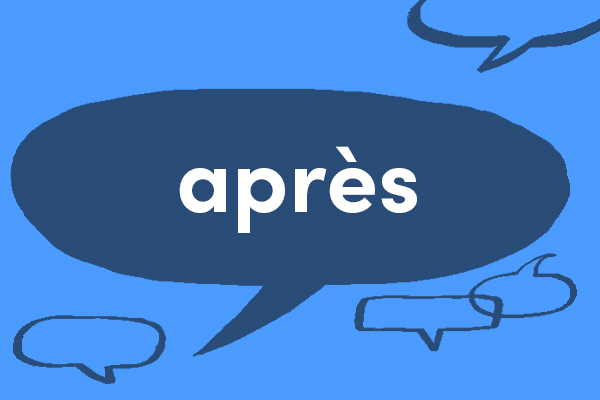Every week, our blog gives you the opportunity to learn a new French word and build your vocabulary. However, we often choose words which come with some complications. This week, we’re looking at après.
To hear its pronunciation, listen to the audio clip below:
Après is both an adverb and a preposition, but don’t worry, our blog will look at both uses. For a reminder on what these grammatical terms mean, check out our Easy Learning French Grammar pages on adverbs which don’t end in -ment, how to use prepositions, and common prepositions in French.
While you might need some time getting to grips with the grammar, luckily the translation is straightforward. Après translates to after or afterwards. You might even be familiar with this word already, as it has made its way into English in phrases like après-ski, meaning ‘after skiing’, or the social events after a day on the slopes.
Let’s start by looking at examples that show the use of après as an adverb:
Je dois finir mes devoirs, mais je peux vous rejoindre après. I have to finish my homework, but I can join you all afterwards.
Ils sont partis peu après. They left shortly after/afterwards.
Cette histoire s’est passée quinze ans après. This tale took place fifteen years later.
Now we’ll have a look at après as a preposition. Our examples include some very common set phrases which are certainly worth knowing for conversational French:
après les cours after class
après mon anniversaire after my birthday
après tout after all
aussitôt après immediately after
d’après according to
D’après moi… In my opinion…
D’après les infos, cette guerre ne cessera jamais. According to the news, this war will never end.
Après vous ! After you! (Imagine saying this as you hold open the door for someone to walk through.)
Après qu’elles sont parties en Canada, mes cousines ne me parlent plus. After they left for Canada, my cousins don’t talk to me anymore.
après avoir/être + [past participle of verb] after having + [past participle of verb]
Après avoir mangé, nous avons commandé des cocktails. After having eaten, we ordered some cocktails.
Finally, there are also a few instances of après becoming part of a compound, or mot composé: that is, two or more words brought together to create a new word. We already saw après-ski, which is used in French as well as English, but you might also come across:
l’après-midi afternoon
l’après-soleil aftersun lotion
l’après-shampooing conditioner (for hair)
l’après-guerre post-wartime; post-war period
après-demain the day after tomorrow
Martine va arriver après-demain. Martine is arriving the day after tomorrow.
After all of that French learning, we think you can give yourself a pat on the back! We hope to see you here again next week.
Written by Holly Tarbet, freelance copywriter and editor.
All opinions expressed on this blog are those of the individual writers, and do not necessarily reflect the opinions or policies of Collins, or its parent company, HarperCollins.




collins_dictionary_official
The home of living language. #wotd #wordlovers #collinsdictionary
Read our word of the week definitions and blog posts: